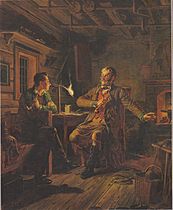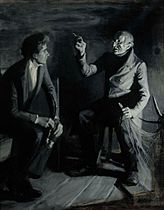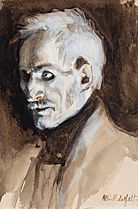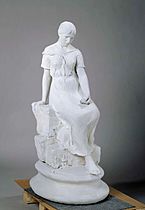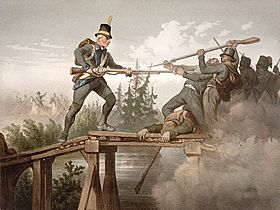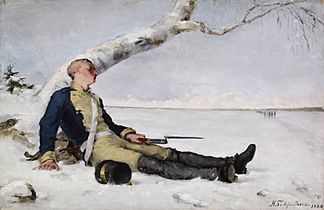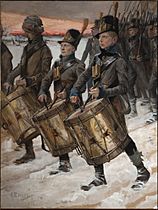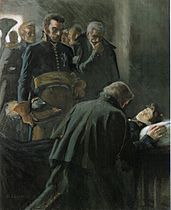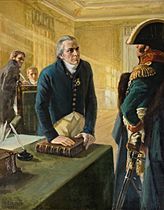The Tales of Ensign Stål facts for kids
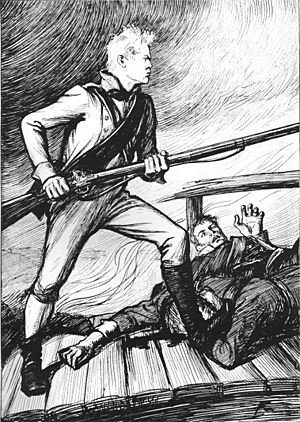
The Tales of Ensign Stål (in Swedish: Fänrik Ståls sägner) is a famous collection of poems. It was written in Swedish by Johan Ludvig Runeberg, who is Finland's national poet. The poems tell stories about the Finnish War (1808–1809). In this war, Sweden lost its eastern lands, which then became part of the Russian Empire as the Grand Duchy of Finland. The collection was published in two parts, first in 1848 and then in 1860.
Contents
About the Poems
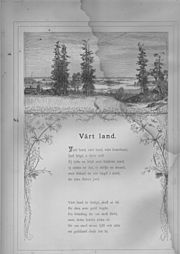
The first part of Ensign Stål came out in 1848, a time of big changes in Europe. The second part followed in 1860. This collection of poems greatly helped shape what it means to be Finnish. During the Winter War, copies were even given out for free to boost people's spirits. The very first poem in the collection, Vårt Land, became the national anthem of Finland.
Soldier Names Explained
The main character's name, "Stål," means "steel" in Swedish. This is a good example of a "soldier's name." These were simple names, often related to military traits or nature, given to Swedish soldiers by their leaders. Many characters in Runeberg's poems have such names. For example, Dufva means 'pigeon', Svärd means 'sword', and Hurtig means 'quick'.
Heroes of the Finnish War
The poems in Ensign Stål feature many real officers who fought in the Finnish War. These include important leaders like marshals Wilhelm Mauritz Klingspor and Johan August Sandels. Other generals mentioned are Carl Johan Adlercreutz and Georg Carl von Döbeln, along with Colonel Otto von Fieandt.
Ordinary People as Heroes
A special thing about The Tales of Ensign Stål is how it shows everyday people as heroes. This was very important for building a sense of national pride in Finland. It showed that common people, even with hard lives, were worthy and brave. Sometimes, they were even seen as more honorable than the upper class.
The Boy Soldier's Story
One powerful poem is "Soldatgossen" ("Boy soldier"). It tells the story of a young boy whose family members were all soldiers. They all died fighting for their country. The boy is now an orphan, but he is very proud of his family's military past. He remembers his father, who joined the army at just fifteen. The boy wants to follow in his father's footsteps and join the army too. He says he wants to go "where the bullets sing hardest." This poem shows the strong ideals and way of thinking at that time. It highlights the idea of honor and duty to one's country.
Famous Characters
Among the most famous characters is Sven Dufva, a simple but very brave soldier. The organizations Lotta Svärd and the Swedish Women's Voluntary Defence Organization were named after the character Lotta Svärd from the poem of the same name. These characters and poems became symbols for defense groups.
Impact on Culture and History
From when it was published until the mid-1900s, The Tales of Ensign Stål was a must-read in both Finnish and Swedish schools. It helped shape how people remembered the Finnish War and its real-life figures. For example, Admiral Carl Olof Cronstedt is mostly remembered today for surrendering the fortress of Sveaborg. On the other hand, the Russian general Yakov Kulnev is shown in a positive light as a brave and honorable soldier.
Translations and Illustrations
Ensign Stål was first translated into Finnish in 1867 by a group led by professor Julius Krohn. Later translations were done by Paavo Cajander in 1889 and Otto Manninen in 1909. The famous artist Albert Edelfelt created beautiful illustrations for the poems between 1894 and 1900. Because the language became old-fashioned, a new translation was released in 2007. This new version caused some discussion, especially about the new words for the poem Vårt Land, which is Finland's national anthem.
Gallery
-
The Croft Girl, Ville Vallgren, 1882
-
Sven Dufva and the Battle of Koljonvirta by Carl Staaff
-
Wounded Warrior in the Snow, Helene Schjerfbeck, 1880, the scene not directly from any poem but influenced by them
-
Wilhelm von Schwerins död, Helene Schjerfbeck.jpg
The Death of Wilhelm von Schwerin, Helene Schjerfbeck, 1886
See also
- Gustaf Adolf Montgomery
- Sven Tuuva the Hero, a 1958 film based on the Sven Dufva poem
 | Ernest Everett Just |
 | Mary Jackson |
 | Emmett Chappelle |
 | Marie Maynard Daly |


